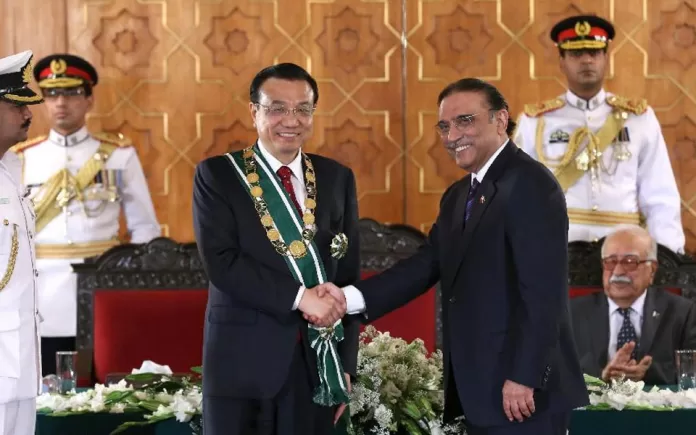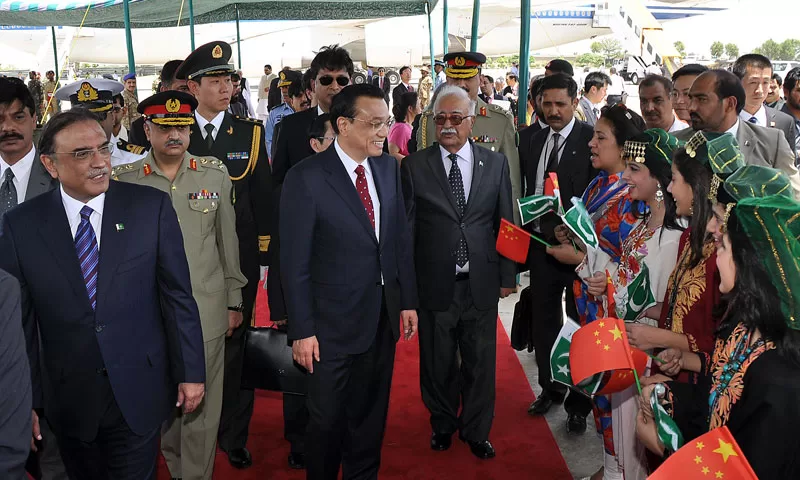
Recent visit of Chinese Premier Li Keqiang has provided further impetus to the strong and time tested friendship that Pakistan and China have nurtured over the previous decades. Twelve agreements signed during the visit include a number of arrangements which are of strategic consequence. Focus on economics, connectivity and finding a solution to Pakistan’s energy shortfall indicates that the two countries are poised to move towards a long term and enduring partnership. Though there is no border issue between the two friendly countries, an agreement on border posts and border management is reflective of the desire to take care of even anticipated irritants.
Bilateral currency swap arrangement is a monumental decision, besides boosting two-way trade this would also help in reducing Pakistan’s dependence on traditional lenders and donors; hence a critical dependency would be offset to a great extent. In a connected arrangement, setting up of bank branches in each other’s major cities would make the financial transaction easy and speedy.
Chinese leadership is fully aware of ongoing regional and international conspiracies to keep Pakistan off balance. It was refreshing that Mr. Li declared in equivocal categorical terms that his country would support sovereignty, independence and territorial integrity of Pakistan. This would certainly elevate the morale of people of Pakistan, who are bravely confronting and countering all such conspiracies through their resolute unity and conviction. However, there was no mention of word ‘Kashmir’ either in speeches or in the joint statement but reference to resolution of all regional issues through dialogue is surely an implicit reference to Kashmir and this, coupled with earlier remarks of the Chinese Ambassador to Pakistan Mr. Li Jan that his country is ready to play its role in the resolution of the conflict is reflective of Chinese diplomatic support for the purpose.
Language barrier between the people of China and Pakistan has been a stumbling block in the way of free and frank people-to-people communication. Realisation to undo this barrier has been snowballing over the years. In this context, China has offered to expand teaching of the Chinese language programme; it will train 1000 Chinese-language teachers for Pakistan. This would go a long way enhancing people-to-people contacts.
Pakistan is facing acute energy shortages, a glimpse of which Mr. Li might have witnessed during his visit; his announcement to continue to extend cooperation in the use of civil nuclear technology has gone down well with the people of Pakistan. It is encouraging that China is going ahead with cooperation in the civilian nuclear technology; this is an area in which western countries led by America have been meting out discriminatory treatment to Pakistan, despite Pakistan’s willingness to accept IAEA safeguards for all these facilities.
Inter connectivity is another way of perpetuating friendship. Pakistan’s proximity to warm waters has been a point of envy for north Asian countries. Pakistan and China have agreed to jointly work on an economic corridor for enhanced connectivity. Control of Gwadar port was given to a Chinese commercial company earlier this year. Envisaged corridor would link Gwadar port with Xinjiang and other parts of China. Project would include road and rail links, alongside optic fibre and oil pipelines for boosting energy, trade and transport between the two countries. China’s outlet to the Indian Ocean via Gwadar would reduce the transit time from weeks and months to three to four days only. Gwadar is close to Strait of Hormuz, which is a key oil shipping lane. Therefore, Gwadar could open up an economic corridor from the Gulf, across Pakistan to western China. Pakistan would get the transit fee that will be a tremendous boost for its feeble economy.
China and Pakistan believe that terrorism, separatism and extremism pose serious threats to regional peace, stability and security. Both sides reaffirmed their resolve to continue their practical cooperation to jointly combat these “Three Evil Forces”. Mr. Li said: “We recognise the positive contribution Pakistan has made to maintain peace and stability and combat terrorism. This support from the Chinese leadership would help defuse unnecessary Pakistan bashing by the western media.
The summit also brought forth the commonality of perception about the evolving situation in Afghanistan. The contours of post 2014 Afghanistan are likely to have great implications for the regional security and stability. The two sides have renewed their support for the “Afghan-owned and Afghan-led” peace and reconciliation process, and agreed to work with the regional countries and the international community to help Afghanistan achieve peace, stability and security. A common stance with China on Afghan conflict would help Pakistan take bold initiatives while bridging the perceptional gaps between the Afghan political resistance groups and the occupation forces.

Traditionally, two countries have maintained pragmatic military cooperation. These military exchanges are not directed against any third party and contribute to peace and stability in the region and the whole world. As a part of welcome ceremony, Mr Li’s aeroplane entered Pakistan air space with a special escort of six JF-17 aircraft of Pakistan Air Force. JF-17 is a joint production of Pakistan and China. The speed at which this project was completed is a matter of envy for some of the countries who have spent decades in pursuit of such projects and have not been able to reach the end point. There are other success stories too like Al-Khalid main battle tank and Frigates for Pakistan Navy. Chinese collaboration in the field of defence industry, especially facilitation in transfer of technology has enabled Pakistan to overcome yester-years, agony of discriminatory sanctions by our westerner suppliers of military hardware.
Agreement on “Satellite Navigation” would enable Pakistan to have an alternative to American satellite based navigation facility “Global Positional System” (GPS). Such systems are widely used by ships and aeroplanes to reach their destinations. There has been a lingering apprehension in the minds of Pakistani military leadership that American facility may not be available to Pakistan during any conflict or regional tension.
Both countries plan to enhance their bilateral trade to $15 billion from the current $12 billion over the next two years. So far balance of bilateral trade has remained tilted toward China. However, China is mindful of the effects emanating from this difficulty, and is taking measures to address this issue. As a result, Pakistan’s export to China has increased by nearly 50 per cent during the last year. Mr. Li said, “The Chinese government will continue to encourage Chinese companies to invest and do business in Pakistan. We also welcome Pakistan to participate in projects for leapfrog development in Xinjiang”. These offers would certainly open new avenues for economic activity between the two countries, of which Pakistan would be the major beneficiary.
As expected, the visit of the Chinese Prime Minister, Li Keqiang proved to be a resounding success and the foundation laid during the visit would surely take the bilateral cooperation and friendship to new heights. In his pre visit interview, Mr. Li had called Pakistan “Iron Brother” to signify that relations between the two were on unshakeable footing. His visit after the general elections in Pakistan and before the formation of a new government indicates that the friendship is everlasting, not affected by “trivialities” like change of government.




